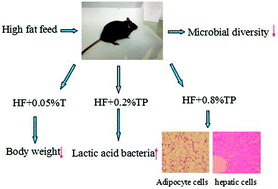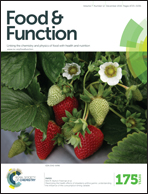The effect of green tea polyphenols on gut microbial diversity and fat deposition in C57BL/6J HFA mice
Abstract
Quantitative and qualitative changes in gut microbial composition have been linked to obesity and obesity-related complications, and eating pattern has been shown to significantly impact the gut microbiome. Meanwhile, tea polyphenols are known to have health benefits such as improving glucose tolerance and decreasing liver fat deposition that may be helpful in combating obesity and obesity-related disorders. We therefore studied the effect of green tea polyphenols on gut microbial diversity and fat deposition in C57BL/6J Human Flora-Associated (HFA) mice, which were divided into five groups: low fat (LF), high fat (HF), high fat + 0.05% tea polyphenols (HF + 0.05% TP), high fat + 0.2% tea polyphenols (HF + 0.2% TP) and high fat + 0.8% tea polyphenols (HF + 0.8% TP). 16S rRNA V6–V8 region PCR-DGGE profiles showed that a high fat diet was associated with a significant reduction in microbial diversity. This reduction could be alleviated by a HF + 0.2% TP diet, with a significant increase in the number of lactic acid bacteria in the HF + 0.2% TP group compared with the LF group (P < 0.05). Body weight (P < 0.05) and fat pad weight (P < 0.001) were significantly increased in the HF compared with the LF group, with notable adipocyte hypertrophy in the HF group, indicating successful establishment of the high fat model. Body weight among the HF + 0.2% TP group and HF + 0.8% TP group (but not the HF + 0.05% TP group) was significantly lower than the body weight in the HF group (P < 0.01). Therefore, tea polyphenols may effectively retard diet-induced weight gain and body fat gain, adipocyte hypertrophy and hepatic steatosis in a dose-dependent manner.


 Please wait while we load your content...
Please wait while we load your content...